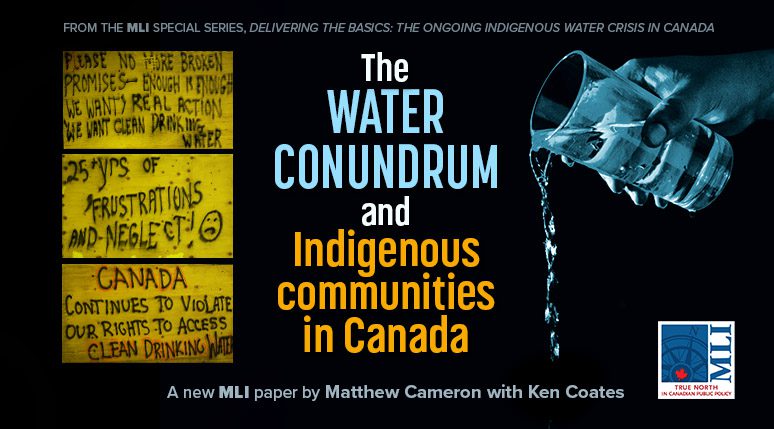OTTAWA, ON (November 22, 2023): Access to clean drinking water is a necessity, yet delivering it to all 40 million Canadians, particularly Indigenous communities, has proven to be elusive. Successive federal governments have both acknowledged the problem, yet have failed to fully eradicate drinking water advisories, which remain in place in at least 27 Indigenous communities.
In a new paper, The water conundrum and Indigenous communities in Canada, Matthew Cameron and Indigenous Program Director Ken Coates shed light on the water insecurity crisis on Canada’s reservations and recommend a number of multijurisdictional policy initiatives, urging policymakers adopt an increased sense of urgency in systematically address the problem – not just throwing money at it.
The authors identify several key barriers to resolving the water insecurity crisis:
- Community location: some communities are located too far away from freshwater reserves; many of these places were settled in the 1950s and 1960s, without scientific study of the suitability of their locations for water purposes;
- Long-term maintenance: trained personnel often work in stressful conditions with little or no local backup, making it difficult to find and retain these workers;
- Little margin for error: nationally determined Canadian water quality standards are, appropriately, difficult to meet, setting a high bar for small, isolated communities;,
- Poor national understanding of the challenges: Canadians who live off reservation are largely unaware of the urgency of the crisis in Indigenous communities.
Cameron and Coates recommend the following policy initiatives to address the crisis:
- Continuous transparency; authorities should make information about water delivery systems and water treatment facility down-times available to the public;
- Region-wide water management systems: these would provide for a sharing of personnel, professional backup, and collective learning about water systems maintenance and treatment facilities, thereby creating a maintenance economy;
- Option of relocation: in extreme cases, where water supplies are unacceptable and alternatives too expensive, communities could be given the option of voluntary relocation and rebuilding in a location with better access to potable water;
- More attention to remote solutions: giving agency to local Indigenous governments and/or companies to resolve the crisis;
- Increasing urgency: Indigenous Canadians wonder if the country cares or even knows about their lack of access to clean water– greater awareness among Canadians can push politicians to seek policy alternatives.
“Understanding the challenges in full, handling emergencies expeditiously, developing and implementing long-term solutions, and committing publicly to providing First Nations with adequate and appropriate water supplies is not an act of generosity or an optional exercise. Maintaining safe drinking water is a foundational responsibility of government,” conclude Cameron and Coates.
“Further delays should not be acceptable.”
To learn more, read the full paper here:
Matthew Cameron is a Yukon-based researcher and academic. He is an Instructor at Yukon University, where he has taught in the Liberal Arts, Indigenous Governance and Multimedia and Communications programs since 2016.
Ken Coates is a Distinguished Fellow and Director of Indigenous Affairs at the Macdonald-Laurier Institute and a Professor of Indigenous Governance at Yukon University.
For further information, media are invited to contact:
Skander Belouizdad
Communications Officer
613-482-8327 x111
skander.belouizdad@macdonaldlaurier.ca







